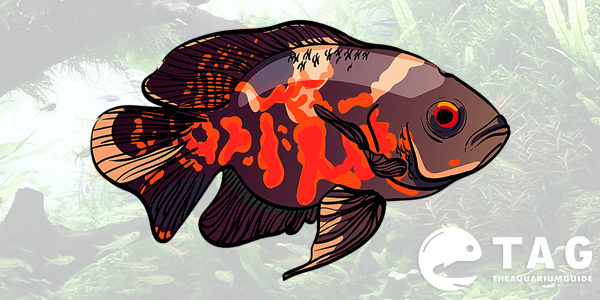The Oscar fish, scientifically known as Astronotus Ocellatus or commonly known as a River Dog or Dog Fish, is one of the largest South American cichlids reaching about 12 inches long and is a fascinating fish to keep as a pet. Oscars are very docile fishes in relationship with its owner, but one must be very careful about its tank mates.
They are not very hard to care for which is why many aquarists that can afford a large tank and love cichlids begin by keeping Oscar fish.

Table of Contents
Tank requirements
First of all, by being so big, the Oscar fish will need a very large tank, 125-gallons minimum for one fish or a pair. Like all fish, the water needs to be very clean, which is why you should use a very powerful filter, as fish so large produce a lot of waste.
The Oscars are tropical fish, which means they like their water to be between 72 to 77 degrees Fahrenheit and do well in slightly acidic water with a pH between 6.5-7.2.
They prefer weak water movement, but you must use at least one air stone, as their natural river environment provides plenty of oxygen through faster water movement.
To make them feel more at home, about 75% of the tank must provide hiding places. Use heavier decorations to avoid them being moved around, but be careful to choose ones without sharp edges that could hurt your Oscars.
Feeding your Oscars
In the wild, the Oscar fish eats mainly meaty foods like smaller fish, insects, or worms, but also supplement its diet with plant matter and berries that fall into the water.
In your home tank, you can choose to feed it special processed food for carnivorous cichlids and also give them occasional treats like frozen food, insects, or mealworms.
Feeder fish like guppies or small minnows are also a nice treat to enhance the Oscar’s ability to hunt and avoid boredom, but you must be aware newly introduced fish may bear infections or parasites, so make sure you quarantine them before offering them to your cichlids.
Only feed your Oscars once a day, the amount of food they would consume in 2 minutes. Leftovers effect the water quality and could make your fish sick.
Diseases
The main disease affecting Oscar cichlid is commonly known as hole-in-the-head disease, which produces pits of cavities on the face and head. It is caused by the lack of specific nutrients including Vitamin D, Vitamin C, phosphorus, and/or calcium.
This disease can also be caused by a poor or unvaried diet, as well as filtration through a lot of chemicals like activated carbon.
Apart from this disease, Oscar fishes are very hardy and rarely become ill if kept in good condition, but you should always keep an eye on them for bacterial or fungal infections, as well as parasites.
When spotted in an early stage, any illness or infection can be treated more quickly and efficiently.
Always remember to quarantine everything you bring to your tank, from new tank mates to plants and other decorations, as they may all bring infections or parasites.
Behavior
The Oscar fish is also known for its ability to bond with its owner and interact.
Many owners state their Oscars even eat from their hand or wait to be “petted.” Also, they are curious and like to watch what is going on in the room and can even be seen begging for food.
They like to rearrange their tank, so do not put too much effort into decorating in a specific style since once they get into the tank; they dig up the plants and move the decorations to suit their own taste.
Tank mates
In the tank, the Oscars will be best either alone or in a pair. Avoid keeping more of them, as they can become territorial and aggressive to each other. Being predators, keeping smaller fish in the same tank is not recommended, as the Oscars will hunt them down.
Instead, you can keep larger fish like Jack Dempsey‘s, Arowanas, Black Pacus, and large Plecostomus, but you need to have a very large tank (about 200-gallons minimum) to allow plenty of space for swimming.
Even if you plan on keeping your Oscars together with other same-sized fish, make sure their tank mates are not too aggressive or too passive. Aggressive fish will hunt down the Oscars and peaceful fish will be hunted down by the Oscars.
Breeding your Oscars
It is easy to breed Oscars in captivity, though they are pretty hard to sex. When you do spot a breeding pair, offer them a breeding tank of at least 100-gallons to provide plenty of space for swimming.
Water should be warmer (between 78-86 degrees) and, as long as it’s very clean, it could be either soft or hard.
The female lays her eggs on smooth stones and both parents raise the fry together. There is no such thing as eating the eggs or fry for the Oscar.
If you like fish with a great personality, it’s time to add some Oscars to your tank, but remember to provide them with a very large tank to make them feel at ease.
By following the requirements and needs of your Oscar, you should be good friends for more than a decade.
